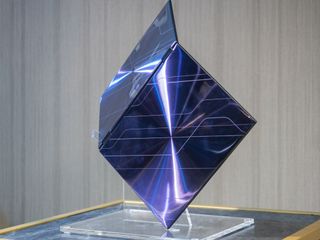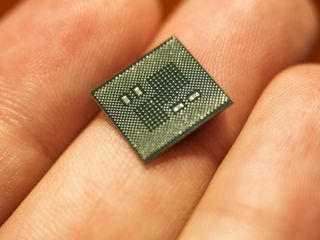Computex 2018: All the biggest announcements (and coolest stuff)
Taipei brought the goods.

Computex is a very PC-centric show, which makes it a real blast for Windows fans. Not only do some of the biggest PC manufacturers roll out their newest wares, but we get to see exciting new components that will go inside future devices, and we often get a peek at the near future of personal computing.
Here's all the best stuff we saw this year in Taipei.
ASUS
Hometown manufacturer ASUS always has a big presence at Computex, and this year was no exception. The company hit on all fronts, from high-end laptops for designers like the ZenBook Pro and it's somewhat questionable ScreenPad trackpad-screen to laptops for everyday folks like the VivoBook S and ZenBook S.
And, of course, the Republic of Gamers brand came on strong, with the ROG Strix SCAR II and Hero II. These gaming laptops bring all the specs and gamer-centric design that gamers want, while maintaining a portable design that you can easily take on the go. Not to mention all the RGB lights you could ever want.
ASUS's phone division was represented as well with the ROG Phone, the first ASUS phone designed for gamers. It brings the best performing Qualcomm Snapdragon 835 chips, a rare 8GB of RAM, and advanced cooling systems — including a clip-on fan to make sure it stays cool for longer. And it is most definitely and ROG device, with the same aggressive styling and even an RGB-light logo on the backside. Because why not?
And then there was ASUS Project Precog. Normally I don't pay too much attention to future PC concepts, but this one really got me excited. Essentially, it's the quintessential two-screen concept future laptop (no keyboard, just screens), but ASUS says it's a real product and not far from launch — by the end of 2019! There's still a lot that's up in the air — what'll be inside it, how will it work, cost, etc — but it's exciting that this long-envisioned future of computing not far away.
- The ASUS ROG Strix Hero II and SCAR II gaming laptops bring intense style and specs
- ASUS ROG Phone hands-on: A fantastic option for a particular kind of gamer
- The ASUS ZenBook Pro 15 has a screen for a touchpad and I don't know why
- ASUS's new ZenBook S is thin and light without skimping on specs
- ASUS VivoBook S: I hope you like colors
- The ASUS Project Precog concept is exactly the insane laptop future we need
MSI
Also representing on the gamer front was MSI, though they did so in a particularly understated fashion, especially for them. After a decade building PCs that were clearly designed with gamers in mind on the tech and aesthetics front, MSI has debuted their Prestige line of PCs, starting with the PS42. It's far less aggressively styled than the black-plastic-and-red-lights of MSI laptops of the past, opting instead for a sleek aluminum chassis that works out in the real world. But don't think MSI is forgetting about the tech inside — it's still a capable gaming machine, even if it doesn't look the part.
Get the Windows Central Newsletter
All the latest news, reviews, and guides for Windows and Xbox diehards.

Processors
It was an interesting show for processors. First Intel debuted their first 5GHz processor, 40 years after the first Intel chip breached the 5MHz barrier, and then they revealed that a 28-core CPU would be coming by the end of the year. The very next day, AMD took the opportunity to one-up Intel by announcing an upcoming 32-core version of the Threadripper 2 CPU. The gigahertz wars are behind us, but the Cores War is just getting started.
On the flip side of that was Qualcomm, rolling out the Snapdragon 850 CPU for the first time. This new ARM chip is focused on the lower end of PCs and is due in devices later this year. Qualcomm is targeting the lower end of the PC market, in the $500-800 price range, right around where many PC buyers shop, and not coincidentally right around where the competing iPad is priced. The Snapdragon chip brings several advantages over comparable Intel chips, such as lower heat and power demands, which can lead to thinner and lighter and cooler devices, as well as always-on connectivity (no unlike your phone).
- The 5GHz desktop CPU is official: This is the Intel Core i7-8086K
- Intel will launch an insane 28-core CPU in Q4 2018
- AMD unveils Threadripper 2: 32 cores, 64 threads, 250W TDP
- Hands-on with the built-for-Windows Qualcomm Snapdragon 850 ARM processor
Microsoft
The presence of Microsoft at Computex 2018 was rather low key, but they did have one announcement in store: the new category of Windows Collaboration Displays. These large-format PCs are inspired by the Surface Hub, putting a Windows 10 computer into a large display with quality audio and cameras built in and optimized for collaborative tools like Office 365 and Whiteboard. The first will be made by Sharp and Avocore, with more manufacturers to come. And that's about all we know — though it'll probably be a while before these devices start appearing in a boardroom near you.
Derek Kessler is Special Projects Manager for Mobile Nations. He's been writing about tech since 2009, has far more phones than is considered humane, still carries a torch for Palm, and got a Tesla because it was the biggest gadget he could find. You can follow him on Twitter at @derekakessler.

